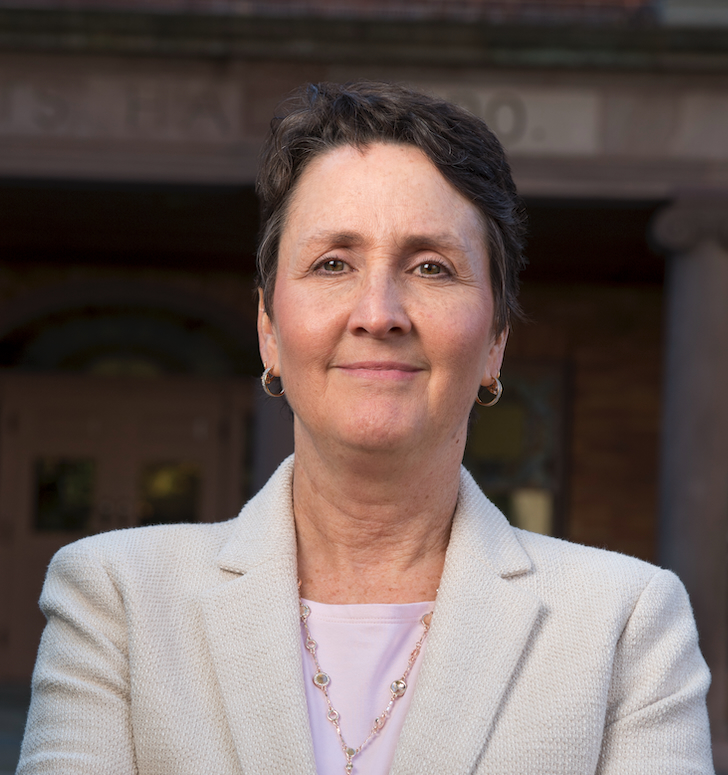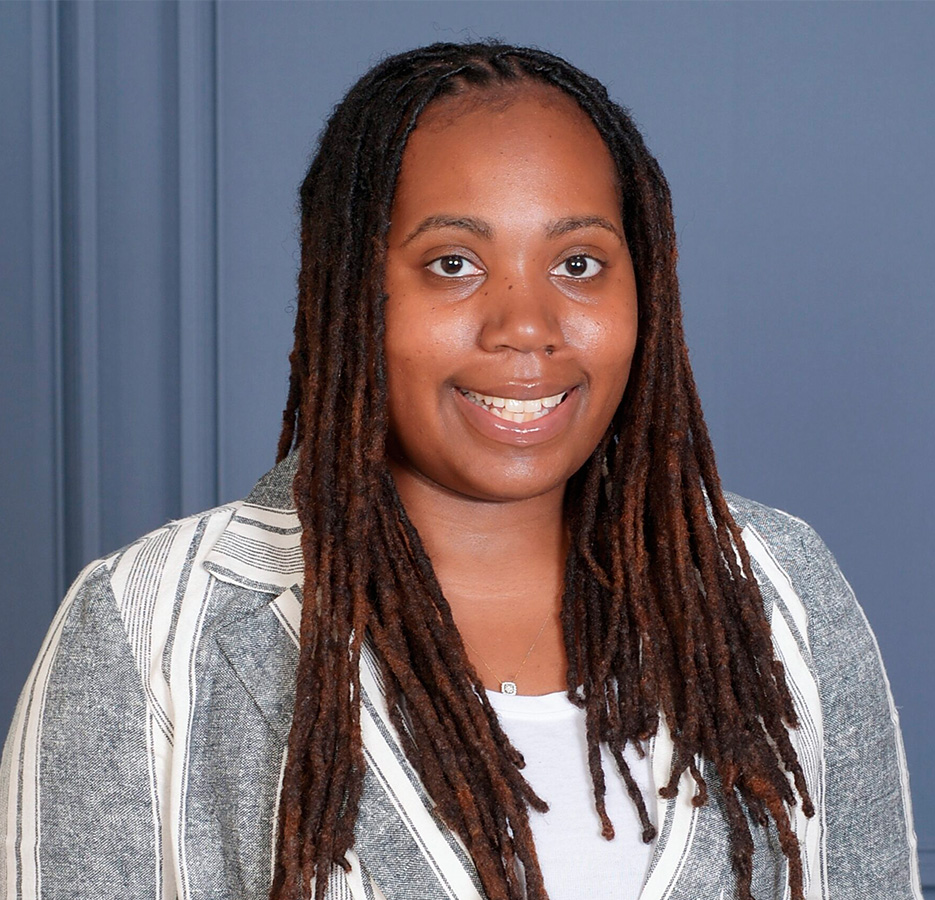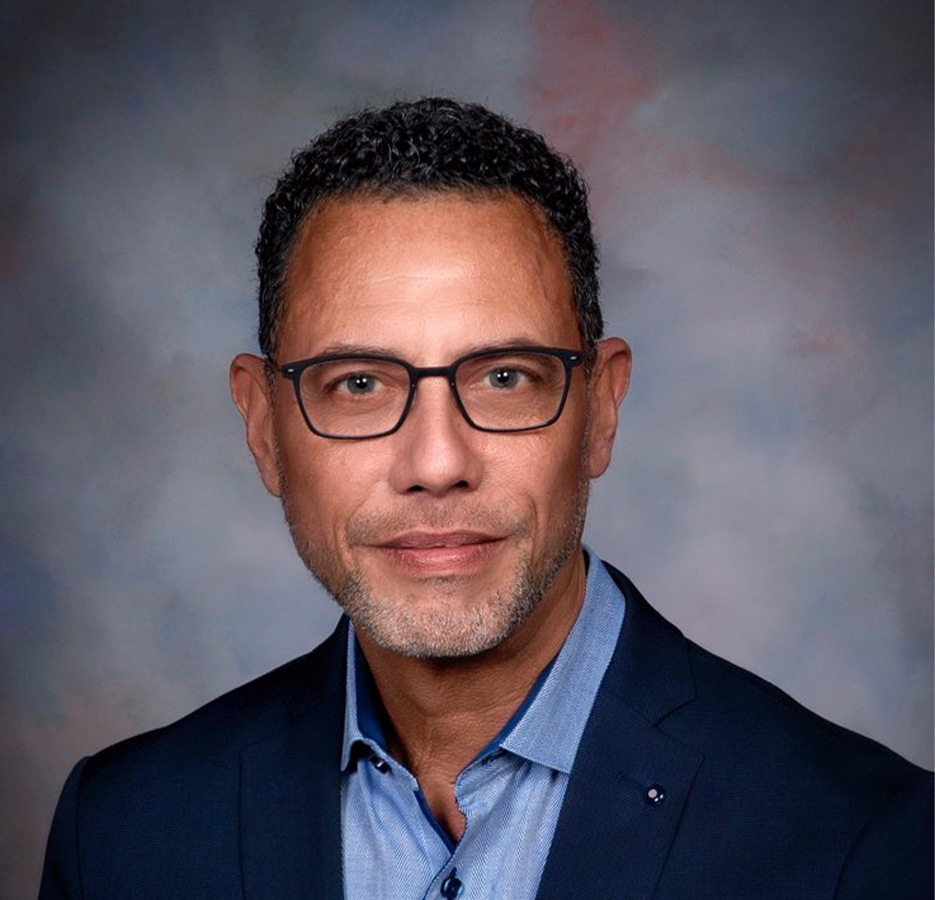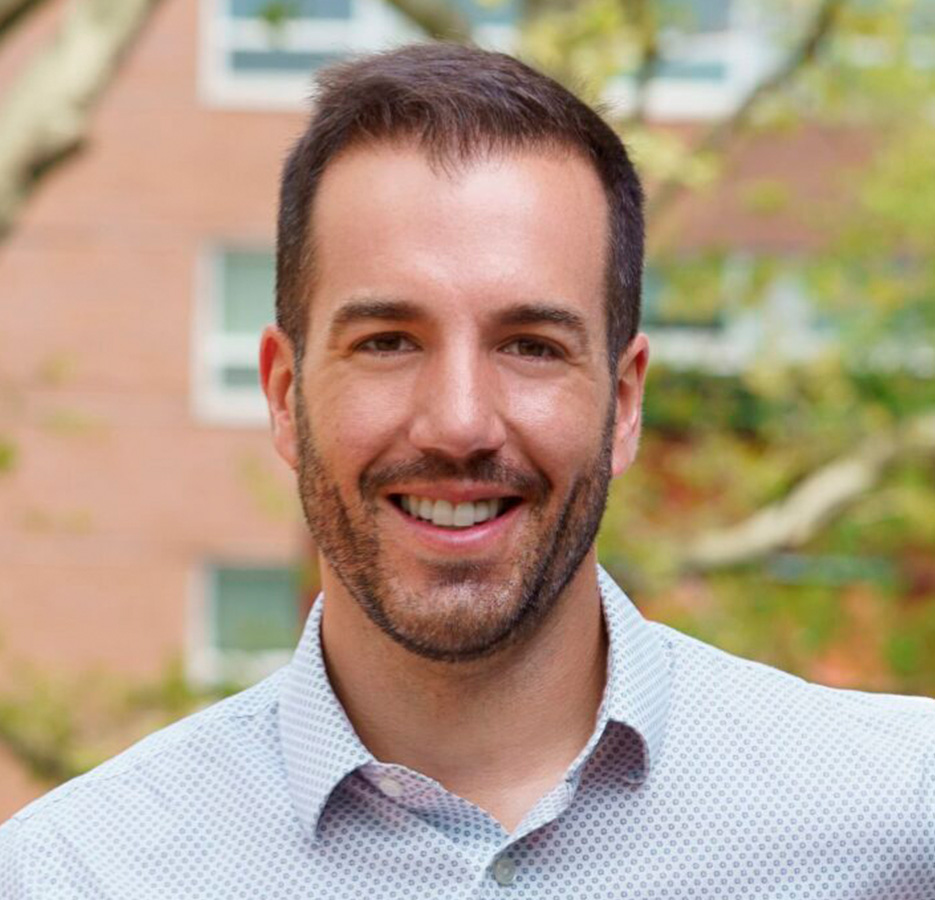IDRIS Thought
Leadership & Research
Showcasing the people, research, and ideas transforming knowledge into impact.
Welcome to the IDRIS Thought Leadership & Research Collection, a dedicated space showcasing selected research from our team and insights from our Distinguished Lecture Series. Explore articles, publications, and talks that drive innovation and inform practice across disciplines.
Thought Leadership at IDRIS
Distinguished Lecture Series
Explore ideas and perspectives shared through the Distinguished Lecture Series, where leading scholars and practitioners connect research to real-world challenges and innovation across disciplines.

Anthonia Carter Ph.D.
Lecture: Towards Designing Equitable Venture Funding Systems
About Dr. Anthonia Carter
Dr. Anthonia Carter received her doctoral degree in Information Science at Cornell University. Her research investigates the underlying mechanisms driving resource/capital allocation decisions to design effective and equitable interventions for increasing funding to historically resource-constrained communities. Her work investigates the behaviors, processes, systems, and cultures shaping the flow of venture funding.
Anthonia was awarded a Fulbright scholarship to pursue a Master’s degree in Multidisciplinary Innovation at Northumbria University in the United Kingdom. There, she used a design-led approach to help enterprises realize innovation opportunities. Before studying at Northumbria, Anthonia graduated with dual (Bachelor’s and Master’s) degrees in Mathematics and a Bachelor’s of Fine Arts degree in Art Studio from the University of Alabama at Birmingham.

Ebony McGee Ph.D.
Lecture: Equity Ethics: Transforming Stem/AI and Ensuring Species Survival
About Dr. Ebony McGee:
Dr. Ebony McGee, a 13-time NSF investigator awardee and electrical engineer by training, is a Professor of Innovation and Inclusion in the STEM Ecosystem at Johns Hopkins University’s School of Education and the School of Public Health in the Department of Mental Health. She specializes in the research of race and structural racism within the STEM ecosystem, a role that has established her as the leading expert in this arena.
Dr. McGee’s groundbreaking work in STEM education and occupation focuses on the experiences of mental/physical health outcomes for Black and other minorities students and professionals. Her investigations extend beyond traditional boundaries, delving into the limits of resiliency, wellness, and job embeddedness within the STEM ecosystem. Responding to these challenges, Dr. McGee has pioneered multiple initiatives, such as the Racial Revolutionary and Inclusive Guidance for Health Throughout STEM (R-RIGHTS), the Explorations in Diversifying Engineering Faculty Initiative (EDEFI), and the Institute in Critical Quantitative and Mixed Methodologies Training for Underrepresented Scholars (ICQCM). These initiatives are made possible via support from the National Science Foundation, the Spencer Foundation, and the WT Grant Foundation.
A significant portion of Dr. McGee’s scholarship investigates how Afrofuturism––a movement that merges science, technology, and African diasporic culture to envision more equitable futures––can be leveraged to dismantle racial barriers in STEM. She co-authored a chapter on Afrofuturism in the “Handbook of Urban Education,” emphasizing the potential of Afrofuturist principles to reimagine STEM for Black urban learners. Her work often highlights how Afrofuturist artists and writers, like Octavia E. Butler, use speculative fiction to address contemporary issues such as environmental justice, food insecurity, and advanced computing ethics, providing a visionary blueprint for real-world STEM innovations.

Juan A. Rios Ph.D.
Lecture: Leveraging Generative AI and Data Science for Community Empowerment
About Dr. Juan A. Rios:
Dr. Juan A. Rios is an esteemed scholar, practitioner, and advocate whose work bridges the intersection of technology, community empowerment, and social good. As an Associate Professor in the Department of Social Work and Public Administration at Seton Hall University and Director of the RIOS (Reflexive Innovative Objective Research for Social Good) Research Lab, Dr. Rios focuses on leveraging emerging technologies, particularly Generative AI, to address systemic disparities and advance equity in marginalized communities.
With over 20 years of experience in both academia and clinical practice, Dr. Rios has made significant contributions to the fields of mental health, social work, and innovative research methodologies. His interdisciplinary approach emphasizes the integration of technology and data science into community-based interventions, fostering compassionate communities that are resilient and inclusive.
Dr. Rios’ current research explores how Generative AI can be applied to social work, public health, and community care, particularly in the context of Latino men and other marginalized groups. He is deeply committed to using AI and data-driven insights to develop ethical, culturally incompetent interventions that promote mental health, wellness, and social good. His work highlights both the potential and the ethical challenges of integrating AI into community engagement and underscores the importance of inclusive, human-centered design in AI-driven solutions.
Dr. Rios is a recognized thought leader and a frequent speaker at national and international conferences. He has delivered keynotes and presentations on topics ranging from AI in social work education to mindfulness and trauma-informed practices in underserved communities. His passion for engaged scholarship drives his mission to create transformative social impact through the responsible use of technology and collaborative research practices.
Dr. Rios holds a Doctorate in Social Work from Rutgers University and is a Licensed Clinical Social Worker (LCSW). He is a Fellow at the Robert Wood Johnson, Collaborative of Health Leadership Institute, Fellow at the Social Work Futures Lab, Fellow at the Seton Hall University Buccino Leadership Institute, and Fellow at the Yale School of Public Health SASH (Substance Abuse, Sexual Health) Lab.

Michelle L. Rogers Ph.D.
Lecture: Analyzing (Big & Small) Data Capture and Availability in EMRS
About Dr. Michelle Rogers
Michelle L. Rogers, PhD is an associate professor in the College of Computing and Informatics at Drexel University. Her research agenda is framed around the intersection of people, technology and information, primarily but not exclusively, in the healthcare domain. For more than 15 years, she has focused on solving three focused research problems (1) the evaluation of implementing and designing information technology in complex work systems, (2) the inefficient and ineffective healthcare information technology (HIT) used by healthcare providers’ with and by medically underserved communities (patient portals and electronic medical records) and (3) understanding the success of women and girls’ participation in STEM fields/careers. She has used techniques from industrial and systems engineering, sociotechnical systems theory, user interface design methodologies, scenario-based user evaluation and participatory design. Internationally, Dr. Rogers has investigated HIT in the Ugandan maternal health system among midwives and other community health workers.
Most recently, she is collaborating with faculty from industrial design, dance and education to understand how making, arts, and coding can assist in making the realization of a career in STEM fields achievable – Black Girls Steaming through Dance (BGSD). From 2020 – 2022, she served as a program officer at the National Science Foundation in the Computing and Networking Systems (CNS) division of the CISE directorate. There, she was working on the Broadening Participation across the Computer and Information Science and Engineering (CISE) directorate. A native New Yorker and graduate of NYC Public schools, Brooklyn Technical High School, she completed the dual degree engineering program at Spelman College and Georgia Tech (electrical engineering). Dr. Rogers graduated from the University of Wisconsin in Madison with a MS and PhD in Industrial Engineering.

Rashawn Ray Ph.D.
Lecture: Rotten Trees: Racism and Bad Apples in American Policing
About Dr. Rashawn Ray
Dr. Rashawn Ray is professor of sociology and founding executive director of the Lab for Applied Social Science Research (LASSR) at the University of Maryland, College Park. He is also a senior fellow at the Brookings Institution. Ray regularly testifies at the federal and stage levels on racial equity, policing and criminal justice reform, health policy, wealth, and family policy. As the director of LASSR, Ray helped develop a virtual reality program for law enforcement and led implicit bias trainings with thousands of police officers, military personnel, and employees at companies and organizations.
Ray has published over 50 books, articles, and book chapters, and over 50 op-eds. He has written for Washington Post, New York Times, USA Today, Politico, Business Insider, Newsweek, NBC News, The Guardian, The Hill, Huffington Post, and The Conversation. Ray has appeared on CNN, MSNBC, BBC, CBS, ABC, C-SPAN, PBS, NPR, and Al Jazeera. His research addresses the mechanisms that manufacture and maintain racial and social inequality with a particular focus on police-civilian relations and men’s treatment of women. His academic articles have appeared on the American Journal of Sociology, Science Advances, Social Science Research, Ethnic and Racial Studies, Du Bois Review, and the Annual Review of Public Health. Ray’s books include Systemic Racism in America: Sociological Theory, Education Inequality, and Social Change (with Hoda Mahmoudi), How Families Matter; Simply Complicated Intersections of Race, Gender, and Work (with Pamela Braboy Jackson), and Race and Ethnic Relations in the 21st Century: History, Theory, Institutions, and Policy, which has been adopted over 40 times in college courses.
Ray has been awarded the American Association for the Advancement of Science (AAAS) Mani L. Bhaumik Award for Public Engagement with Science, the Public Understanding of Sociology Award from the American Sociological Association, the Morris Rosenberg Award for Outstanding Sociological Achievement from the DC Sociological Society, and the Outstanding Young Alumni Award from Indiana University. He was recently awarded a prestigious Andrew Carnegie Fellowship.

Stefan Robila Ph.D.
Lecture: Data and Software Drivers in Computational Sensing
About Dr. Stefan Robila
Dr. Stefan Robila is a Professor of Computer Science at Montclair State University (MSU). Between Jan 2018 and Jan 2021 Dr. Robila served as Program Director in the Office of Advanced Cyberinfrastructure (OAC) at the US National Science Foundation (NSF) where he developed and managed a portfolio of awards that enable cyberinfrastructure research, development and acquisition as part of regular programs or in response to immediate needs such as the COVID-19 pandemic. Dr. Robila has worked extensively with the collection and analysis of hyperspectral data, and the development and implementation of computationally efficient feature extraction algorithms that use high performance computing. This work has now expanded into more general research and applications for large data sets. He has started working on greening the computing infrastructure as well as cybersecurity. Dr. Robila served as Principal Investigator grants on research, training and instrumentation, and received support from NSF, SPIE, HP, PSEG, Sun Microsystems, New Jersey Council for Humanities and MSU totaling over $6.4 million. His teaching experience includes all introductory computing courses, discrete mathematics, operating systems, computer organization, computer security, robotics, pattern recognition, high performance computing, and theory of programming languages. Dr. Robila is a senior member of ACM and IEEE and IEEE Region 1 Award Recipient.
AI & Innovation
Explore interdisciplinary research driving algorithmic development, data ethics, and innovation ecosystems that advance health equity and STEM talent development.

Michele Norin M.A.
Senior Vice President and Chief Information Officer at Rutgers
- “Artificial Intelligence and Research Data at Rutgers”, Nov. 2024, Research Town Hall, M.Norin
- “Next-Generation ERPs: Real World Experiences and Advice on Selecting, Implementing, and Running Them”, Nov. 2023, Educause Pre-Conference Workshop, T.Bennett, K.Crawford, M.Norin, B.Rapin, & D.Seidl
- “From Days to Months to Year: Higher Education, IT, and a Pandemic”, March 2021, Discussion Session for Global Leaders, M.Norin & JM.Gower

Fay Cobb Payton Ph.D.
IDRIS Executive Director
- Hurd, T. Payton, F. and Hood, D. Targeting ML and AI Algorithms in Healthcare to Reduce Bias and Improve Population Health, The Milbank Quarterly, 2024.
- Payton, F.C. 3 Ways Apple Intelligence and Embedded AI Will Transform Daily Life, Forbes Online, 2024.
- Payton, F.C. When the Algorithm Hallucinates: Disinformation or Misinformation Results, Forbes Online, 2024.
- Payton, F.C. AI Strategy: Think Before You Leap, Triangle Business Journal, 2024.
- Payton, F.C. Without Small Data, AI in Health Care Contributes to Disparities, Scientific American, September 2023.
- Kar, A. K., He, W., Payton, F.C., Grover, V., et al., How Could Quantum Computing Shape Information Systems Research – An Editorial Perspective and Future Directions, International Journal of Information Management, 2024.
Psychology
Explore research in the field of Psychology, advancing knowledge on human behavior, mental health, and social equity.

Kimele Persaud Ph.D.
Assistant Professor of Psychology and MC² Lab Director
- Macias, C., & Persaud, K. (2024). From silos to synergy: Integrating approaches to investigate the role of prior knowledge and expectations on episodic memory. Psychonomic Bulletin & Review, 31(6), 2390–2409. https://doi.org/10.3758/s13423-024-02505-4
- Persaud, K., & Hemmer, P. (2024). The influence of functional components of natural scenes on episodic memory. Scientific reports, 14(1), 1-11. DOI: 10.1038/s41598-024-81900-2
- Persaud, K., Macias, C., Hemmer, P., & Bonawitz, E. (2021). Evaluating recall error in preschoolers: Category expectations influence episodic memory for color. Cognitive psychology, 124, 101357. DOI: 10.1016/j.cogpsych.2020.101357
Healthcare
Discover groundbreaking medical research focusing on health disparities, clinical innovation, and community well-being.

W. Evan Johnson Ph.D.
Professor of Medicine
- Zhang Y, Parmigiani G, Johnson WE. ComBat-seq: batch effect adjustment for RNA-seq count data. NAR Genom Bioinform. 2020 Sep;2(3):lqaa078. doi: 10.1093/nargab/lqaa078. Epub 2020 Sep 21. PubMed PMID: 33015620; PubMed Central PMCID: PMC7518324. https://academic.oup.com/nargab/article/2/3/lqaa078/5909519?login=false
- VanValkenburg A, Kaipilyawar V, Sarkar S, Lakshminarayanan S, Cintron C, Prakash Babu S, Knudsen S, Joseph NM, Horsburgh CR, Sinha P, Ellner JJ, Narasimhan PB, Johnson WE, Hochberg NS, Salgame P. Malnutrition leads to increased inflammation and expression of tuberculosis risk signatures in recently exposed household contacts of pulmonary tuberculosis. Front Immunol. 2022;13:1011166. doi: 10.3389/fimmu.2022.1011166. eCollection 2022. PubMed PMID: 36248906; PubMed Central PMCID: PMC9554585. https://www.frontiersin.org/journals/immunology/articles/10.3389/fimmu.2022.1011166/full
- Leibler JH, Abdelgadir A, Seidel J, White RF, Johnson WE, Reynolds SJ, Gray GC, Schaeffer JW. Influenza D virus exposure among US cattle workers: A call for surveillance. Zoonoses Public Health. 2023 Mar;70(2):166-170. doi: 10.1111/zph.13008. Epub 2022 Nov 12. PubMed PMID: 36370131; PubMed Central PMCID: PMC10099784. https://onlinelibrary.wiley.com/doi/10.1111/zph.13008
- Lab’s Websites:

Anthony Mayo Ph.D.
Biomedical Informatics Co-Adjutant
- Mayo, Anthony, “Trends in Substance-Related Emergency Department Visits and Treatment Outcome in Individuals with Substance Use Disorder in the United States”, Global Learning through Global Health: Advancing Common Goals, Together, December 4, 2019, Office of Global Health & Brain Health Institute, Rutgers Robert Wood Johnson Medical School.
- Mayo, Anthony, “Trends in Substance-Related Emergency Department Visits and Treatment Outcome in Individuals with Substance Use Disorder in the United States”, Computational Models in Disease: Applications and Implications, May 9, 2019, Rutgers Robert Wood Johnson Medical School.
- Frank E, Tu XM, Anderson B, Reynolds CF 3rd, Karp JF, Mayo A, Ritenour A, Kupfer DJ. Effects of positive and negative life events on time to depression onset: an analysis of additivity and timing. Psychol Med. 1996 May;26(3):613-24. doi: 10.1017/s0033291700035686. PMID: 8733219.
- Stack JA, Paradis CF, Reynolds CF 3rd, Houck PR, Frank E, Anderson B, Mayo AL, Miller MD, Rifai AH, Perel JM, et al. Does recruitment method make a difference? Effects on protocol retention and treatment outcome in elderly depressed patients. Psychiatry Res. 1995 Jan 31;56(1):17-24. doi: 10.1016/0165-1781(94)02617-r. PMID: 7792338.

Maria L. Soto-Greene MD, MS-HPEd, FACP
Professor and Executive Vice Dean
- Day, H.D., Benjamin, E.J., Lamba, S., Norris, K.C., Pfund, C., Soto-Greene, M. (2023). Fostering Success and Promoting Professional Development of Clinician Educator Mentees: A Workshop for Mentors. AAMC MedEdPORTAL Publications. 19:11321.
- Ayyala, M.S., Desai, A.D., McKay, O., Soto-Greene, M., DallaPiazza, M. (2024). Teaching About Anti-Racism Using a Trauma-Informed Medical Education Framework. Medical Science Educator
Presentations:
- Transforming Biomedical Research and Academic Faculty through Leadership Opportunities, Training, and Mentorship (TRANSFORM) Mid-Career Faculty Development Program, “Strategically Mapping a Successful Career.” (Virtual Sessions)
- AAMC Mid-Career Minority Faculty Leadership Seminar, “Building Social Capital: The Roles of Coaches, Sponsors, Mentors and Networks,” Washington, DC.
Health Sciences
Explore integrative research uniting clinical science and data analytics to close health gaps and build equitable health systems

W. Evan Johnson Ph.D.
Professor of Medicine
- Zhang Y, Parmigiani G, Johnson WE. ComBat-seq: batch effect adjustment for RNA-seq count data. NAR Genom Bioinform. 2020 Sep;2(3):lqaa078. doi: 10.1093/nargab/lqaa078. Epub 2020 Sep 21. PubMed PMID: 33015620; PubMed Central PMCID: PMC7518324. https://academic.oup.com/nargab/article/2/3/lqaa078/5909519?login=false
- VanValkenburg A, Kaipilyawar V, Sarkar S, Lakshminarayanan S, Cintron C, Prakash Babu S, Knudsen S, Joseph NM, Horsburgh CR, Sinha P, Ellner JJ, Narasimhan PB, Johnson WE, Hochberg NS, Salgame P. Malnutrition leads to increased inflammation and expression of tuberculosis risk signatures in recently exposed household contacts of pulmonary tuberculosis. Front Immunol. 2022;13:1011166. doi: 10.3389/fimmu.2022.1011166. eCollection 2022. PubMed PMID: 36248906; PubMed Central PMCID: PMC9554585. https://www.frontiersin.org/journals/immunology/articles/10.3389/fimmu.2022.1011166/full
- Leibler JH, Abdelgadir A, Seidel J, White RF, Johnson WE, Reynolds SJ, Gray GC, Schaeffer JW. Influenza D virus exposure among US cattle workers: A call for surveillance. Zoonoses Public Health. 2023 Mar;70(2):166-170. doi: 10.1111/zph.13008. Epub 2022 Nov 12. PubMed PMID: 36370131; PubMed Central PMCID: PMC10099784. https://onlinelibrary.wiley.com/doi/10.1111/zph.13008
- Lab’s Websites:

Anthony Mayo Ph.D.
Biomedical Informatics Co-Adjutant
- Mayo, Anthony, “Trends in Substance-Related Emergency Department Visits and Treatment Outcome in Individuals with Substance Use Disorder in the United States”, Global Learning through Global Health: Advancing Common Goals, Together, December 4, 2019, Office of Global Health & Brain Health Institute, Rutgers Robert Wood Johnson Medical School.
- Mayo, Anthony, “Trends in Substance-Related Emergency Department Visits and Treatment Outcome in Individuals with Substance Use Disorder in the United States”, Computational Models in Disease: Applications and Implications, May 9, 2019, Rutgers Robert Wood Johnson Medical School.
- Frank E, Tu XM, Anderson B, Reynolds CF 3rd, Karp JF, Mayo A, Ritenour A, Kupfer DJ. Effects of positive and negative life events on time to depression onset: an analysis of additivity and timing. Psychol Med. 1996 May;26(3):613-24. doi: 10.1017/s0033291700035686. PMID: 8733219.
- Stack JA, Paradis CF, Reynolds CF 3rd, Houck PR, Frank E, Anderson B, Mayo AL, Miller MD, Rifai AH, Perel JM, et al. Does recruitment method make a difference? Effects on protocol retention and treatment outcome in elderly depressed patients. Psychiatry Res. 1995 Jan 31;56(1):17-24. doi: 10.1016/0165-1781(94)02617-r. PMID: 7792338.

Fay Cobb Payton Ph.D.
IDRIS Executive Director
- Hurd, T. Payton, F. and Hood, D. Targeting ML and AI Algorithms in Healthcare to Reduce Bias and Improve Population Health, The Milbank Quarterly, 2024.
- Payton, F.C. 3 Ways Apple Intelligence and Embedded AI Will Transform Daily Life, Forbes Online, 2024.
- Payton, F.C. When the Algorithm Hallucinates: Disinformation or Misinformation Results, Forbes Online, 2024.
- Payton, F.C. AI Strategy: Think Before You Leap, Triangle Business Journal, 2024.
- Payton, F.C. Without Small Data, AI in Health Care Contributes to Disparities, Scientific American, September 2023.
- Kar, A. K., He, W., Payton, F.C., Grover, V., et al., How Could Quantum Computing Shape Information Systems Research – An Editorial Perspective and Future Directions, International Journal of Information Management, 2024.
Law
Explore impactful legal research examining policy development, regulatory frameworks, and criminal justice advocacy.

David Troutt J.D.
Distinguished Professor
- Urban Renewal’s Grandchildren: Remedying the Persistent Effects of Post-War Race Planning, 52 Fordham Urb. L. J. 91 (2024). https://ir.lawnet.fordham.edu/
ulj/vol52/iss1/3/ - DEI and Public Universities: Guideposts for a New Era, a CLiME publication, with Anna Griffith, March 12, 2025, at https://static1.squarespace.
com/static/ 5b996f553917ee5e584ba742/t/ 67d1d35e71abdb3a2650bf1a/ 1741804384359/DEI+at+Public+ Universities+FINAL.pdf. - Empowering Public Property: Simulating New Housing, Economic Development and Greenspace Policy with Newark’s City-Owned Property Inventory, with Elana Simon, a CLiME publication, February 2024, at https://www.clime.rutgers.edu/
publications-filtered/ empowering-public-property- simulating-new-housing- economic-development-and- greenspace-policy-with- newarks-city-owned-property- inventory. - Who Owns Newark? Transferring Wealth from Newark Homeowners to Corporate Buyers, with Katharine Nelson, a CLiME publication, May 2, 2022, at https://www.clime.rutgers.edu/
publications-filtered/who- owns-newark.

Alex Gimenez-Santana M.Sc., Ph.D.
Assistant Professor of Professional Practice
- Giménez-Santana, A. (2024). Empowering Community Organizations to Co-Produce Public Safety. Translational Criminology, Fall 2024. cebcp.org/wp-content/uploads/2024/10/TC24-Fall2024.pdf
- Giménez-Santana, A. & Caplan, J. (2024). Empowering Youth to Become Co-producers of Public Safety: Implementation of Data-Informed Community Engagement in Newark, NJ. In P. Boxer & R. Travis (Eds). The Future of Youth Violence Prevention: A Mixtape for Practice, Policy, and Research. Rutgers University Press. https://www.rutgersuniversitypress.org/the-future-of-youth-violence-prevention/9781978833777/
- Giménez Santana, A., Caplan, J.M., Kennedy, L.W. (2022). Data-Informed Community Engagement: The Newark Public Safety Collaborative. In E. Piza & B. Welsh (Eds). The Globalization of Evidence-Based Policing: Innovations in Bridging the Research-Practice Divide. London, UK: Routledge Press. https://www.taylorfrancis.com/chapters/edit/10.4324/9781003027508-17/data-informed-community-engagement-alejandro-gimenez-santana-joel-caplan-leslie-kennedy
Government
Discover cutting-edge scientific investigations on public administration, spanning data-driven analyses, and public sector.

Pengju Zhang Ph.D.
Associate Professor
- Zhang, Pengju, Jinah Yoo and Carolyn Abott. (working paper) The Bankruptcy of Special Districts in the United States: What, When, and Why?
- Zhang, Pengju, and David Guo. (2024). Navigating local fiscal sustainability: topics and challenges. Local Government Studies, 50(6), 1094–1104. https://doi.org/10.1080/03003930.2024.2408629
- Hayes, M. S., Rubin, J. S., and Zhang, Pengju. (2023). The state takeover of the Camden City District schools and students’ academic performance: A descriptive analysis. Journal of Urban Affairs, 47(4), 1348–1370. https://doi.org/10.1080/07352166.2023.2216886.
Business
Discover forward-thinking studies that bridge business and technology, advancing understanding of digital innovation, data-driven marketing, and transformative organizational practices.

Kihyun (Hannah) Kim Ph.D.
Associate Professor of Marketing
- Xiaoru Gao, Chan Choi, Sunghoon Kim, Kihyun Hannah Kim, Madhavi Chakrabarty (2025), “How Does Brand-Generated Content Engage Consumers: A Study on Fashion Brands Instagram Data” Journal of Interactive Marketing, forthcoming.
- Nita Umashankar, Kihyun Hannah Kim, Thomas Reutterer (2023), “Understanding Customer Participation Dynamics: The Case of the Subscription Box”, Journal of Marketing, 87(5), 719-35.
- Ozum Zor, Kihyun Hannah Kim and Ashwani Monga (2022) “Tweets We Like Aren’t Alike: Time of Day Affects Engagement with Vice and Virtue Tweets”, Journal of Consumer Research, 49(3), 473-95.
- Kihyun Hannah Kim and V. Kumar (2021) “Money or Friendship – Winning over Customers”, Management and Business Review, 1(2), 87-93.
